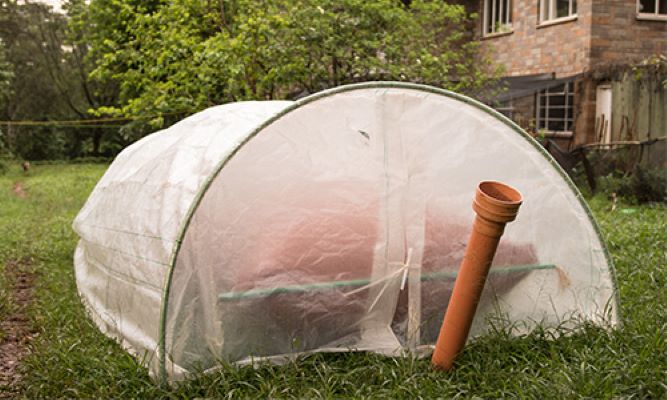By Zablon Oyugi
A dairy farmer from Nairobi County’s Dagoreti South Constituency has successfully lowered production costs and minimized environmental impact by adopting a modern fabricated bio-digester.
This innovative biogas production technology enables the generation of clean energy for home cooking and lighting, as well as the production of nutrient-rich organic fertilizer.
Mary Wainaina, says that before, she spent Ksh2,600 every month to refill a 13kg cylinder gas to support her home cooking and boiling of water used in her small dairy farm to clean equipment among other activities.
“I supplemented this with firewood I got from cutting down some of my few trees leaving my land under threats of soil erosion. The smoky kitchen during cooking also caused me coughs and untidy environment,” said Mary.
Besides, she also relied on the costly electricity for lighting and the normal and the less nutritious cow dung fertiliser for her vegetable and fruit farming.
However, things have changed for the farmer and her household after an act of hospitality in allowing the county government to conduct a farmer training at her home.
“After the two moths training, I was gifted with a bio- digester which the county officials along with their technician installed in July and since then my venture and life has significantly improved,” said the farmer.
That was the first time the farmer who runs a small dairy farm of 19 cows at Kagondo area interacted with the technology which only requires two exotic cows or four indigenous breeds to run.
“I no longer use the gas cylinder for cooking and electricity for lighting saving me from the ever-rising fuel and power costs. I have also reduced cutting down of my few trees saving my soil from the threat of erosion and bringing back the cool weather I enjoyed in yester years,” said the veteran farmer since 1982.
Her younger daughter Margaret Wairimu, 35, who is now running most activities in the farm says the bio-digester enables them also to produce an organic fertiliser called bio-slurry which they use to grow vegetables, fruits, and animal feeds.
“We have been using animal manure but the bio-slurry is proving to be more nutritious and safer for plants and the environment,” said Margaret adding that they currently spend no money on synthetic fertiliser and pesticides which are also hazardous to the environment.
Generally, the farm has the standard size prefabricated bio-digester of 6m3 capacity which can produce up to 2m3 of biogas enough cater for a household of 5 people. They also collect 20L of bio-slurry from the system daily for their crops.
“We are yet to discover more of this system’s usefulness that include the possibility of upgrading and using it to power our chaff cutter machine. When this happens, our production expenses will reduce significantly,” she said.
Works with any biodegradable materials
According to Josephat Chege, operations manager at Biogas International Ltd, a Kenyan firm and dealers in bio-digester, the main difference between the modern bio-digester system and any other biogas technology is that unlike conventional technologies that run only on cow and pig dung, the latter runs on any biodegradable materials including dungs, poultry droppings, kitchen and market waste, invasive species such as Water Hyacinth.
“The bio-digester system is 100% prefabricated meaning it comes in complete package in a large suitcase of around 50kg with full kit that includes the digester (balloon), 6 inch PVC pipe and a twin burner stove among other materials,” said Chege.
It can take 3-4 hours to install by a technician and start producing biogas in 10-14 days after installation.
The standard size digester can serve 5 household members though there are other larger capacities such as XL Domestic of 9m3 and XXL Domestic of 12m3 which can produce 3m3 and 4m3 amount of biogas and can serve 8 and 12 household members respectively.
The materials they are made of have characteristics of anti-aging, acid, and alkali resistant and ultraviolent proof making the system to last for life safe for some small repairs and maintenance costs.
Carbon offset
According to Daniel Mulat, Biogas Scientists and the Laboratory Manager at the International Livestock Research Institute’s Mazingira Centre, the standard system used by most smallholders can offset 3-5 tonnes of CO2 equivalent per year which can be sold at USD10-20 per tonne worth of carbon credit.
“This money can in turn be used to offer bio-digester system services to the farmers, do repairs and replacements and improve them,” said Mulat.
In this, he says, while small scale agricultural producers and livestock keepers, especially poor farmers who are relatively small contributors to GHG emissions, become part in promoting and sustaining a low- carbon rural path through proper agricultural technology and management systems.








